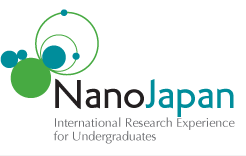

Chris A. Salinas - NanoJapan 2014
Northwest Vista (Community) College
Major: Physics & Nanotechnology
Class Standing: Sophomore
Anticipated Graduation: May 2016
NanoJapan Research Lab: Aoki/Ochiai Lab, Prof. Noboyuki Aoki & Yuichi Ochiai, Chiba University
NanoJapan Research Project: ![]()
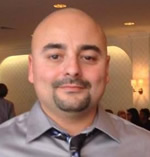
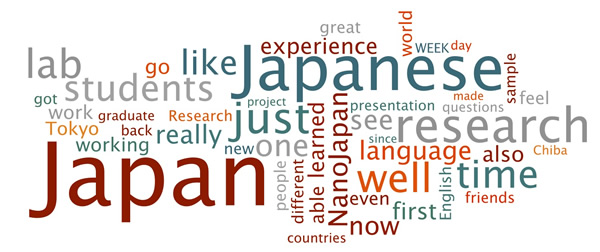
Why NanoJapan?
NanoJapan gives students hands on experience in the research field which allows them to better assess in which direction they should go academically. It also allows students to experience this field in a different culture and establish international connections within the global scientific community, expanding their thinking beyond just national markets. Ever since I heard about NanoJapan I’ve dreamed about participating in this program. I love science and have a deep admiration for Japan and its culture so what more could I ask for than a program that combines two things I love? Over the past two years I’ve learned a lot about nanotechnology from processes to instruments used in the lab, NanoJapan will give me an opportunity to apply what I’ve learned in the classroom in a real world setting. I also plan to do international research outside of the United States, especially in Japan and this will be an amazing stepping stone to achieving that goal or realize if I should redirect my goals before earning my bachelors.
The thing I’m most looking forward to while in Japan is actually getting to live and do research there, I’ve seen many Japanese films and anime that depict life in Japan but that’s only been secondhand experience. Now I’ll get to experience Japan firsthand and learn about its culture within the research field and its society, I look forward to working in a Japanese research laboratory and becoming part of a community and not just a tourist. I also plan to visiting many modern and historical locations as well as having actual Japanese’s cuisine from local restaurants.
My goals for this summer are to:
Meaning of NanoJapan: Post-Program
I thought of NanoJapan as a stepping stone but after completing the program I realized now that it’s a catapult that will not only launch you into your future academic path but will give you a better understanding of the possibilities that pursuing a degree in the STEM field will grant you and in what direction you want to be launched. I never thought it possible to go abroad till after completing my studies, now I know and feel like I can do my graduate studies and research anywhere in the world with an accredited university and plan to do my graduate studies in Japan now after going through the NanoJapan program. I also got a broader view of the world in general from all the individuals I met from the Japanese and the exchange students at my host university to the KIP students that I met in the orientation program discussions in Tokyo, when before all my friends where from the states now I have more friends from around the world and have a more global perception of the world than before. NanoJapan doesn’t just give you the chance to learn about research but also gives you the chance to learn about yourself and the world outside of the United States and how that world sees the United States in turn.
Research Internship Overview
My research project for NanoJapan was working with Nanomagnets, Specifically cobalt nanomagnets with single-notch and y-branch geometries. My objective was to find if the anomalies associated with the y-branch nanomagnet where related to the extra branch by comparing magnetic force microscopy scans of the y-branch nanomagnet with the single-notch nanomagnet. This anomaly was called a vortex and if successful in determining if the geometry of the y-branch nanomagnet was the cause of the vortex, then it possibly could be utilized as a magnetic switch and open up a new way to approach magnetism in nanostructures. This research lines up with my current academic interest of physics with a focus on nanotechnology of which I had just graduated with my associates one day before NanoJapan began. I will continue for my bachelors in Physics and then go for my masters and Ph.D. shortly after, with the amazing experience I had doing research and living in Japan along with the advice and guidance from professors that I worked with over the summer I have decided to do my graduate studies in Japan so that I will be better prepared to do joint research projects between Japan and the US.
The lab I was placed in over the summer had a mixture of undergraduate and graduate students which is not the norm from what I had heard of in Japan, the undergraduate and master students’ desk where together including my own in one office area and the Ph.D. students’ desk were in another room. I also felt that the atmosphere was relaxing and enjoyable and not as strict as I had presumed although I believe my perspective, which I did not know very much Japanese might be the reason for this, there was a lot of communication between the students themselves and the students and the sensei that seemed very casual. My mentor would have me shadow him to learn the ins and outs of the lab in the beginning and then began training me on various instruments that I would be using over the course of the summer and gave me advice on certain aspects of the research as well. My socializing with the research group was not as much as I would have liked but this was cause of the language barrier which was difficult to express oneself over, despite this I did make friends with them and vowed to keep working on my Japanese and to skype with them once I got to conversation level and plan to visit the lab when I returned to Japan in a couple years.
Daily Life in Japan
The first thing you’ll notice about life in Japan is the Sun, and you’ll realize why it’s called “land of the rising Sun” cause the sun rises a little past 4:00 am and it was impossible for me to stay asleep with the sun shining brightly into my room after its rising. This caused me to start my days very early, I would either go for a jog or explore some part of my host city before I would get ready to go to the lab which was around 10:30 am. Once getting to my lab I would say my good mornings and start working on assignments for NanoJapan or work on research till noon, then we would all go get bentos or head to a nearby restaurant for lunch, I would frequent popoki’s a place named after some Hawaiian cat that an inexpensive but very delicious lunch menu. After lunch I would continue with assignments and research and if by chance I had none and could take a small break I would pay a visit to the English House at the university where I could meet exchange students from around the world as well as Japanese students who were interesting in speaking English, I met a great deal of new friends here that I plan to stay in contact with over the years.
Towards the end of the week after lab hours usually 7:00 pm I would go out to eat with either lab mates or friends I had made at the English house, which would include at least 15 of us and up to 70 or more at times. I would also make plans with my friends to do something on the weekend, usually visiting some tourist locations like a temple or beach but if no one was available I would just go explore these locations on my own.
My favorite experience in Japan was… The trip to Gokase and homestay!
Before I left for Japan I wish I had… became fluent in Japanese….
While I was in Japan I wish I had… Known about the Chiba University English house and met the exchange students at my university sooner.
As I expected, even as early from first boarding the airplane to travel to Japan was the use of a language that I didn’t understand and being as curious as I am it was hard for me not knowing what was being said over the intercom or by the individuals around me. Aside from that I didn’t expect much of a culture shock if any and I must admit that the first few days didn’t really feel like I was in a different country at all, like back home I was walking the busy streets along with everyone else going back and forth living our lives. Having a schedule and others that speak your language around you probably lessens the culture shock then if you were on your own and no schedule to follow to give you that sense of familiarity that following a schedule can give you. Speaking of schedules, I expected it to be pretty busy but my expectations have really been blown out of the water and what little time I do have free when not in class, lectures, trips, studying or exploring has been none existent.
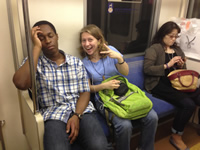
Do as the Locals: After a long day there’s nothing like a nap on the subway.
We as a group have gone out to explore the other districts to take in the culture and as I spend more time in these different districts which are the equivalence of states I have started to see a lot more differences, not only between themselves but with the United States as well. One major difference is how clean and respectful the streets are even if it’s very difficult to find a trashcan and cars always give pedestrians the right of way and I’ve only heard two honks this past week even with lots of vehicles commuting in Tokyo. Another difference is how incredibly nice and pleasing service is here, even in the kobinis which is Japan’s version of convenient stores and the 7-11s I frequent quite a bit, I get greeted when I enter and get charged for my purchase and when I leave I get a pleasant good bye. The biggest difference that I’m personally starting to get very comfortable with, that very much surprises me is how honest and trusting the Japanese are, when before I expected things to get stolen now I expect things to be returned or paid for without any thoughts of doing otherwise.
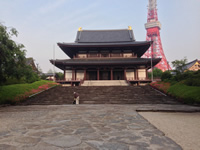
Japan Today: Japan is a mix of old and new with everyone going about their lives.
I started out in one of the advance language classes on the first day but the instructor as well as I realized I was in over my head and suggested I attend one of the basic language classes instead and I must admit it has been a lot better for me on my progression. I’m really enjoying how interactive the language classes are and how they are tailored towards us instead of a normal class setting allowing us to talk about ourselves instead of someone who we have no idea of. One strategy I use that one of the other NanoJapan participants picked up on was my use of my Spanish pronunciation and accent when I talk in Japanese which allows me to sound more fluent than if I talked in an English accent. Another useful strategy is pretending I’m in different situations and thinking of what words to use that would be best in that situation and keep replaying it in my head so when it does happen I’ll be prepared to say the correct words or phrase for the situation. After spending a whole week in Japan I was finally approached by some young Japanese students and I was asked one question in English by each of them and then asked to take a picture with them, this really got me thinking on how Japanese think about the rest of the world and especially about Americans.
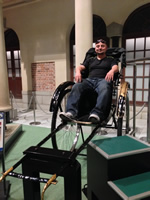
Need A Break: There is so much walking in Tokyo I could use a rickshaw!
Intro to Nanoscience Lectures
Prof. Kono’s lecture was very in-depth and intriguing but unfortunately most of it if not all of the material presented was new to me and I did not have the necessary background to follow as well as I wanted to. If I was to ask for additional information it would be for some more basic explanation on the whole lecture or at least the solid state part which deals with Quantum mechanics and is a field I am very interested in. I did enjoy the color change depending on the size of the nanoparticle, something I’ve worked with and known pertaining to gold nanoparticles but I guess I never really “understood” it just knew what it did till Prof. Kono brought it to my attention with the metallic carbon nanotubes having the opposite color phase change.
The other speakers touched on topics that were relevant to us with this being our first week here in Japan; they shared their experiences when they first moved to Japan and how they adjusted to living here. Dr. Fons presentation especially caught my attention since I would like to pursue a career in Japan after earning my own Ph.D. and his insights have really gave me a lot to contemplate about from now till I have finished my academics. The trip to Elionix was great, I was amazed that a small company could have so much impact on systems and technology and liked their motto and outlook of their company. I really enjoyed the speaker and his message, his English was impressive and he imparted wisdom that would take us a full lifetime to acquire; as he said “full swing!”
Research Project Overview at the Aoki/Ochiai Lab, Prof. Noboyuki Aoki & Yuichi Ochiai, Chiba University
My project at Chiba University was working with Scanning Gate Microscopy (SGM) to study transport analysis of MoS2 field effect transistor but was just told by Prof. Bird after his lecture that they changed it back to what Kevin; the previous NanoJapan student was working on. I will now be working on Magnetic Force Microscopy of the Magnetic Domains in Co Y-branch Structures; Cobalt will be the material I will be working with and is a conductor. I believe it to be a 2D system from the over view of last year’s poster by Kevin, the special properties of cobalt is that it has a high temperature melting point of 1493 C and is naturally ferromagnetic as well as resistant to demagnetization. The focus of the project is on magnetisms on the Y branch structures; if successful the stability and fast processing time of such a technology would lend its self well to computing.
The public transportation in Tokyo or Japan for that matter is a wonder to behold; it answers for me the question why there aren’t that many vehicles here as compared to the United States. The only form of public transportation I’ve used is the Bus in San Antonio, Texas and have never been on a subway or train before coming to Japan so I have very limited experience when it comes to public transportation to compare with but will do my best to compared what I’ve experienced to what I am experiencing now here in Tokyo.
Just as there are certain “rules” when walking the streets of Tokyo there are rules as well for when taking public transportation, one of the main ones I noticed first and read across the postings on the side of the subway was the turning off or silencing of cell phones. I found this strange since pretty much the majority of the individuals are using their cell phones but they are either texting, playing a game or listening to music, which is the same in the United States although in the United States people will be talking on the phone as well and when I say talking I mean letting everyone into their conversation and this is where the difference is. There have been a few instances when I noticed someone talking on the subway but it’s very subtle and they cover their mouth and phone as to not disturb other passengers on the subway and as I mentioned earlier this isn’t the case in America.
Japanese passengers over all are more polite and courteous as well as considerate of their fellow passengers than in the United States, also personal space is much smaller here than Texas at least as I noticed during busy hours were passengers are squeezed into the subway like sardines and we become a sea of passengers at the mercy of the movement of the subway as the tides are at the mercy of the moon. I feel this represents the harmony Japanese value to keep things going as peaceful as possible with everything on time and schedule in an orderly manner. All these “rules” are cultural but they have become part of the culture cause they are practical as well, so they are both and have really opened my eyes to Japanese’s values and how they are interpreted into the everyday traveler’s actions.
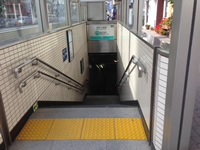
The Thunderdome (aka Subway Entrance: Anyone can enter but you can only leave if you can afford the trip…..
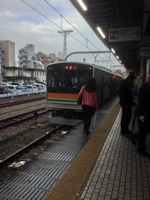
Just Missed It: Get there early or you’ll just get there to see your ride home leave without you!
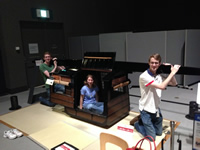
Best Public Transportation: When all else fails, get your fellow NanoJapan mates to carry you around!
Intro to Nanoscience Lectures
I enjoyed Prof. Bird’s first lecture greatly, mostly because I have novice level of knowledge of solid state physics and his lecture was basic enough for me to understand what he was speaking about most of the time. It really gave me a good foundation to understanding solid state physics and its potential as a developing technology that has and will continue to improve society’s quality of life. Prof. Bird’s second lecture was over graphene and its impact on electronics in the past fifty years and today, it was inspiring to think of far we have come along in these fifty years and how much further we could possible go if we fixed some of the problems we have with graphene.
The other lecturers presentations talked about their research that was associated with what Prof. Bird lecture were over but more in depth in terms of their research and intense in knowledge needed to fully grasp the concepts being presented but I was still excited to see them present and the research being done at Tokyo University. I was especially excited to see Prof. Ishizaka since she is a pioneer for women in the department of applied physics at Tokyo University, I regret not asking for her card when she presented so that I might ask her some more questions about her story and Tokyo University. After the tour and seeing lecturers from Tokyo University as well as meeting some KIP students who attend there I’m becoming more and more interested in attending Tokyo University to finish my graduate studies.
Going to Kyushu, specifically Kumamoto was on my list of things to do when I found out I got accepted to NanoJapan, it was because I wanted to see the land were Miyamoto Musashi spent the last few years of his life and where he wrote the book of five rings. Even though this was my initial reason for going and excitement to be getting to spend a weekend in Kumamoto, I have to admit I got more than I bargained for. The landscape was so beautiful much more than what I’m used to in south Texas, Huge mountain ranges covered with trees as far as the eye could see and you couldn’t even see what was underneath that blanket of varying green hues. With that said, what I meant when I said I got more than I bargained for is that I also got to meet and spend time with the people of Kumamoto who reminded me more of old traditional Japan than the sights and sounds of Tokyo.
The first day we went to go see a Volcano that started to shoot out poisonous gas when we were there and we had to leave early but it was pretty exciting! Then we got to see Kagura, which is a Shinto theatrical dance that was pretty amazing to experience in person and won’t soon forget. We spent the first night at a traditional Japanese’s inn and while there I had a lot of questions about things I saw in old Japanese films answered, like why there never was any beds in the rooms and why they were always sitting on mats but now I know the answers to those questions.
The next day we spend the majority of the day with the Gokase students and we did various activities like make sandals from hay and some rope like material, I regret that I was feeling a bit under the weather and was unable to really be myself with the students and show them a good time but I’m grateful to have spent some time with them and given them a more global outlook on life just like the NanoJapan program has done for myself. The highlight of the trip ended up being the homestay, I unfortunately wasn’t feeling good still and I got a sore throat but my homestay family drove me to the nearest pharmacy so I could get medication and I found them to be very kind people. Once we got to their house we started getting the fire pit ready and some seats and we ended up having a Bar BQ outside just like back home and it really opened my eyes to how similar my homestay family was to my own and it made my eyes water a bit but I was too happy to let it go farther than that and I didn’t want anyone to feel sad that night, including myself. Having the sore throat along with the language barrier made it even harder to converse with them but I was able to answer a few questions in Japanese and they seem appreciative of my effort and I was glad I was able to use what I learned in the two weeks in Japanese language class.
The final day we went to see a temple and learn more about the history of Shinto and the location of where the Kagura story happened. I have to say that Japanese values were more prevalent in this rural area than it was in Tokyo and saw how humble and gracious the people of Gokase were and has really shed a new light on Japan for me, this is something I will take with me for the rest of the summer that I am in Japan and beyond.
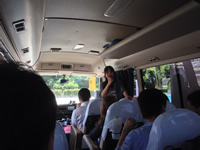
Gokase Bound!: This was the beginning of the Kyushu trip after we landed, we all got on a bus and Lisa Kodama a KIP student who graduated from Gokase high school explained to use about Gokase and the Shinto dance Kagura. We all introduced ourselves in Japanese after the explanation.
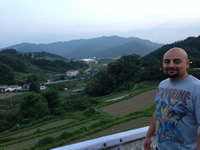
Gokase Landscape: This is the view from my home-stay family’s house, I’ve never seen so many trees and mountains/hills…I can see why Miyamoto Musashi spent the last years of his life here now, not only is the landscape beautiful here but the people who live here are as well!
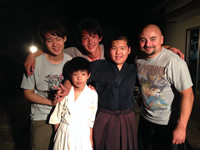
Home-Stay Family kids & KIP students: I told the homestay family about my interest in Samurai and their kids dress up in there Karate & Kendo uniforms and we watched them go through some drills, shortly after we took this picture.
Assessment of Orientation Program and Language Classes
The orientation program in Japan was as intense as I had imagined it would be, with the language classes, science lectures and the exploring of Japan to put into practice the knowledge you just acquired can be quite taxing on you mentally as well as physically. The most helpful part was probably the language classes and how they were done for you specifically, also some of the cultural presentations especially Packard-sensei’s lecture and going out into Japan with Packard-sensei to experience some of Japanese culture first hand really gave me a greater understanding of Japanese and how they think and feel. The least helpful was also one of the Japanese’s culture lecture, thought maybe it wasn’t the point of the lecture itself but the person presenting it or way it was presented which was about being a journalist or something of that nature, most of the NJ students felt it wasn’t relevant at all.
As mentioned before, the language classes being tailored towards you really made them so much more than just being taught in a regular class, It really gave you a sense of learning what you needed to learn to live & work in a Japanese lab. The least helpful for me was to be given Japanese in romaji but that might have just been because I learned hiragana first and was accustomed to reading Hiragana more proficiently than the Romanized version although that’s not saying much! I’m not sure if I’ve developed more strategies than the ones I already mentioned, like using my Spanish accent when speaking Japanese so I sound more like a native speaker. Another strategy I also mentioned was the running of scenarios in my head and thinking of what I should say when those scenarios actually happen, as for a third strategy is imagining the hiragana of words as I pronounce them so I sound them our correctly and not butcher them by just saying what they sound like.
The most important thing that I know now that I couldn’t have even imagined coming from the United States is the inner and the outer feelings of Japanese people. I come from an environment where everyone just shows their outer feelings and it’s been interesting trying to read between the lines and has put my perception to the test. Knowing this has allowed me to not fall into any pitfalls that I might have otherwise and I am grateful for having been told about this before I did.
Three burning questions, I can’t say I’ve really done much questioning than I have done observing, I just sat here for 30 minutes trying to come up with some burning questions and I guess I’ve become good friends with the KIP students and have been in constant contact with them and whenever I have a question I just go ahead and ask them and they give me the answer to my question so most questions don’t become to burning. Most of my questions have been personal as in how is it growing up and going through High school and then to a university in Japan. We even discussed about the inner and outer feelings that I find so interesting and In some ways enjoy it and others not so much, If I had one quest that was burning about it would be if this way of feeling would last in such an ever increasing globalizing of the world especially from my interacting with the KIP students I can feel the conflict within them and wondering if I should support and encourage them to be themselves or if I should just be a spectator and let tradition reign.
Research Update
This week unfortunately wasn’t to kind to me, since arriving back from Kyushu my condition worsened and I had an uncontrollable cough that I did my best to subdue with the medicine here in Japan and constantly having a cough drops in my mouth and taking a sip of water every minutes or so but I did my best to attend the lectures and absorb as much of the information as possible without being too much of a distraction for everyone else.
I was informed by Prof. Bird of my research project well in advance of leaving the states but while he was here doing his lecture he informed me that it had changed do to time constraints and difficulty of obtaining the material/sample here at Chiba’s lab. So my main question would be to have more details on what my research was actually going to be so that I could have some time to look over it but as it seems, time is very limited right now and it would probably not have made much of a difference. I looked over last year’s poster by Kevin to get some idea on what I might be working on and what purpose they might have me do but as of now I’m excited to go into the lab blindly and finding out firsthand what I’ll be working on.
Jade and I finally arrived in Chiba, it was a much shorter trip than I had imagined, and we arrived around two in the afternoon. We were greeted at the station exit by three students from Aoki-sensei’s lab, Akrom, Takeda who is Jade’s mentor and Matsunaga who is my mentor. They showed us to our living quarters where we will be staying for the next two months as well as showed us around the area, like the nearest super markets, department stores, pharmacy and restaurants. We are staying at “Chiba international student housing” and it feels closely like the dorms I stayed at minus the kitchen and living room but it has a small burner and kitchen sink as well as a Japanese bathroom combination that you might expect if you’ve spent some time in Japan you’ll understand, it has AC and free wifi as well so I’m grateful for that. It takes twenty minutes to get to the lab by train and thirty minutes to get there by foot, depending on my mood I either take the train or walk and so far I’ve done both equal times.
We were taken to our lab on the first day by Akrom and Matsunaga and introduced to Aoki-sensei and then were shown to our desk that were facing each other in the office area where all the other students had their desk, the lab was very relaxed and easy going making it easy to settle into our new surroundings, we were given a tour of the lab an hour later after we settled in by Aoki-sensei and then by Jade’s mentor of the clean room. As I mentioned Matsunaga is my mentor and he seems to be a very calm and down to earth, he speaks little English like most of the lab so it is difficult to have a complete conversation with him, with my own limited Japanese as well as anyone else in the lab for that matter but we cope with interlacing of Japanese and English. I can already feel that my lack of Japanese will be a great disadvantage to me to working effectively, or at least as effective as I’d like to be and has really stirred me up inside to get into a Japanese language courses and put even greater effort into learning Japanese so that I can be more effective in the lab and in the day to day interactions that occur.
We were also informed of our project on the first day as well and my objective was made pretty clear to me and understood what we were after, they started working on creating a sample for me to study and run test on but when the sample was finally fabricated it wasn’t made to the specification that were expected and was only able to start working on one of the samples even if it wasn’t to specifications. We have been taking AFM images of the sample and recording our results and saving them, I’m not sure if they are fabricating another sample or if we will have to work with these sample for the duration but as of now it seems we are doing what we can with what we have.
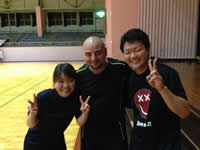
Basketball in Japan: The only lab mate that plays sports is Akina, she took me to go play basketball with her Basketball club. I took a picture with the President and Vice President of the club, in Japan they actually play for fun and it’s not as competitive as it is in America!
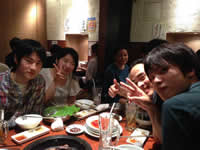
Welcoming Lab Party: The first Friday of the first week here the lab took us to eat Yakiniku, which is Korean Barbecue, here you can see left to right Mine, Akina, Jade in the back ground, Luan and Ryo. I I’ve made some great friends at the Lab!
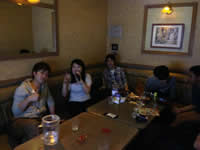
Karaoke After Party: After taking us out to eat they took us out to Karaoke, this is my first time doing Karaoke and I actually enjoyed it a lot! Here is Akina singing “let it go” from the Disney movie Frozen.
Research Project Update
The research project I am working on is a continuation of last year’s project that Kevin worked on, the magnetic Y-branch nanojunction: Domain-wall structure and magneto-resistance. This year as for me the purpose of my research is to find the relationship between the AFM & MFM images around the vortex that occurs when applying and removing a magnetic field from the Y-branch structure. I believe Prof. Bird’s team has already accomplished finding the relationship or I was told something close to that and now we needed to find it for ourselves or why we were not getting the same results as Prof. Bird’s team. We will be fabricating a sample to be tested out of Cobalt coated with gold I believe at least it was used in the fabrication process in the vapor disposition machine to a certain extent, when it comes to acquiring data we will be using the AFM & MFM exclusively from what I was able to gather, though the MFM might just be something possible on the AFM itself but produces a different image pertaining to the magnetic field.
I’ve been taken on a full tour of the clean room where all of our experimenting will be done on the AFM that is located in there, my mentor has given me a quick overview and procedures for the AFM and has been preforming the first rounds on the AFM to give me an idea of how to run it myself when we do our next rounds on the sample. As of now no further training seems to be needed to continue my research as of now but we just started and I’m sure there is more to be expected. I do have a few questions about the research or should I say just some clarifications just in case I’ve misunderstood or there was something lost in translation from my understanding and will be writing a letter to prof. bird on the matter.
I have to say that during the 3 week orientation in Tokyo that I learned a lot about Japanese culture and maybe it was a little too well cause I can’t say I’ve found myself having too many issues when it comes to seeing things in a Japanese perspective. The only moment where I did see something that was differently culturally and actually had some kind of “communication” with another was on the subway. I was sitting down and an older lady stood in front of me and was sleeping while standing there and I gently tapped her and offered her my seat and she refused and gave me a gesture to sit back down. I found her reaction to my kind gesture a bit odd but thought maybe it was one of those situations where you had to ask twice cause they will refuse your first try, so again I did the same and tried offering her my seat and for a second time she refused for a second time and I just sat there thinking to myself why she wouldn’t accept my offer and after a few minutes I just got up and walked to the other end of the cab and when I looked back she was sitting in my seat and it really got me questioning what was going on there?
Well I discussed this matter with some of the Japanese friends I had made and they told me that when I offered my seat it was as if I was telling her that I would stand for her and that wasn’t acceptable, but when I left my seat willingly it would be me just standing cause I wanted to and not for her which I believe is socially unacceptable. I feel this has to do with lack of empathy I’ve seen in the Japanese culture which is the total opposite of the American culture where empathy is a huge part of our lives. I used to believe America had too much empathy and now that I get a chance to see a society on the other end of the spectrum it really has me questioning my own beliefs and ideals and has sparked a deep contemplation within myself on which is better, either way having a chance to live and experience this has been a blessing on in its own.
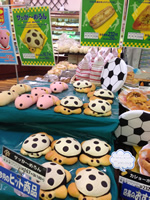
Sweets everywhere! Japan is full of all different kinds of sweets and experiences and I must say both of them are a treat to have every day!
Research Update
The fabrication of our samples was completed late last week but was informed that only one was decent enough to be used for studding. So this week we started running AFM and MFM scans of that sample regardless if it wasn’t to exact specification cause the fabricating machine wasn’t working properly and wouldn’t be able to attempt another fabrication any time soon and would still be good practice for me to learn more and get some time with the AFM. We were able to get 53 scans of our sample with in the allotted time and it was great being able to get some time in the clean room and learn more about the AFM and see the outcomes of our scans.
During the week Aoki-sensei asked me to make a presentation summary for Friday based off the scanned images we had done that week and from what he told me and the examples I had to look at I believed I understood exactly what they wanted and set forth to complete the task at hand, I finished the presentation and worked a little on what I was going to say for this short presentation the night before. When Friday came I went ahead and showed my graduate student my presentation and much to my dismay I apparently didn’t do what was expected and with only a few hours till I had to present I asked to see exactly what they wanted and my graduate student showed me his previous presentation, so I got to work on it right away and was able to finish 2 minutes before it was time to present. Since I hadn’t practiced or understood what the presentation was all about, Aoki-sensei was kind enough to point me in the right direction while presenting so I was able to inform the lab on what exactly they wanted me to and I felt it turned out okay under those circumstances. It really shows the kind of difficult situations that can arise when language plays a barrier and I’ve learned my lesson to ask more questions, see more “examples” if possible as well as have more interacting with my mentor during the process of a project instead of just waiting till the end and find out I did it all wrong after spending so much time on it.
I will be sending the presentation in PPT format, slides 5,6,8,9 is what they were asking for and the rest after 9 is what I did that wasn’t what they wanted, I also realized it was a weekly report on what “our” part of the lab was working on and doing that week and will be doing next week. My graduate student changed the presentation to just 6 or so slides and asked me to send that to Prof. Bird and was under the assumption that he saved this new presentation that he changed onto my flash drive since it was on his laptop but apparently I still have my old save prior to the changes he made. Good thing is I know now exactly what I’m supposed to do and what the purpose of the presentation is all about so I’ll be able to be more efficient with my time and make a better presentation next time.
The hierarchy structure in a Japanese labs is very apparent. The students in the lab don’t necessarily use honorifics unless addressing the sensei of the lab but in their interactions you can see the hierarchy at play. There haven't been any disagreements since I've been here, the students follow, listen to and ask questions to the students above them in the hierarchy and do as they say.
My experience in the lab has been different as it was presented to me in the NanoJapan talks but I believe this is because of the language barrier and not being able to fully grasp and understand what’s going on around me. The time schedule of the lab is as it was mentioned to me by my alumni mentor and feels more like a job schedule compared to an American lab’s schedule.
When it comes to academic research in Japan I would have to say that long hours and working as a team along with networking is valued greatly. That’s not to say that they don’t value hard work but with as many hours that are put into research you are able to spread it out throughout the day so it’s not as hard. In comparison American lab’s value hard work in the shortest amount of time to produce results quickly and it’s usually one individual working on a single project from my experience.
The experience of working in both a Japanese and American lab has really opened my eyes to the similarities and difference between both. If I had the choice to work in determine what lab I would work it I would pick and choose certain aspects from both but as of right now I feel the best one for me to work in that would better prepare me and would be more beneficial to me in the long run would have to be a Japanese’s lab.
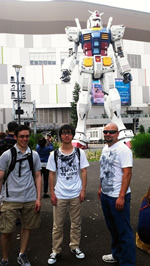
Exploring Japan with new friends.
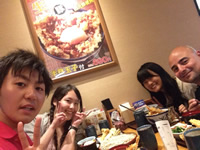
New friends, good times.
Research Project Update
This week some new samples were fabricated but unfortunately the fabricating machine was still not working properly and there was some debris on the samples but luckily one T branch made it unscathed and were able to run scan on it this week. As of now we will continue to run scans on this one sample and will hopefully be able to get substantial data to find the relation between the AFM and MFM images, I will meet with Aoki-sensei soon to discuss in greater detail about the project and have more experience in exchanging ideas cross culturally.
My biggest accomplishment outside of the lab has been going out and meeting new people and having some dialect in Japanese as small as it might be. I’ve learned new things about the Japanese language and people as well as living in Japan as a foreigner and have made some friends in Japan.
My biggest personal challenge has been to not get discourage and to continue doing my best to communicate with the locals and venturing off into the urban jungles of Japan and keep doing my best to continue using my limited Japanese in hopes it won’t be so limited by he time I leave and return to do my graduate work.
At this point the project is coming along nicely with a set of fresh clean samples to test this coming week and having the SPM all to ourselves as well, we’ll be able to finish the project and get the presentation and posters done in time for their due date.
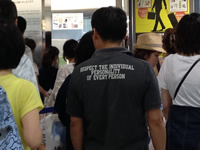
Research Project Update
This week we had a set back of our old sample being to contaminated to acquire satisfactory MFM images off of, my mentor said we will set aside this sample for next week since our mid-program meeting was coming up and upon our return we would have a new sample to run scans on. Cause of the mid-program meeting we did not have a summary to submit.
This summer by far or any other season for that matter has been the most I’ve learned Japanese in, although that’s not saying much to be honest. Being outside of Tokyo and in an area where very little English is spoken has forced me to not only improve my Japanese but also my understanding of the language. At the end of the orientation in Tokyo I felt very confident with my Japanese, almost as if I could almost savor the ability to converse with native speakers, this light at the end of the tunnel I felt so close to quickly disappeared as soon as I set foot past the JR line’s gate and met my mentor in Chiba. This pushed me to enroll into a Japanese language class and I have learned even more Japanese but have come to the first mountain of the Japanese language and still have not gotten any closer to being much more improved than when I left Tokyo but can survive if left on my own.
To say I’ve only had one “most” linguistic challenge would be an understatement, over all the same theme that frustrates me the most is the inability to truly express ourselves and who we really are through the language barrier on both sides. I get a glimpse at the people around me when I see them interacting with others that speak the same language but that seems to disappear when they interact with me for the most part, over time some have started to be more themselves but that language barrier is still there and hard to overcome. The best way I’ve found to overcome this or at least for everyone around to enjoy themselves more is to have more Japanese speakers around so together they are able to help each other feel less shy and to make a complete sentence between them.
I’ve learned that the best place to learn Japanese is in Japan itself! Unfortunately my stay here is coming to an end but this experience has motivated me come back for my graduate studies as well as to spend the next couple of years studying Japanese on my own and taking Japanese classes at my university as well. I have also made a lot of friends in Japan who I plan to Skype with to work on and estimate my proficiency in Japanese during that time.
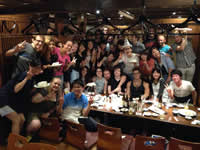
Chiba’s International Students: Here are about a quarter of Chiba’s international students celebrating the 4 birthdays in July all at once, there were over 15 countries represented at this birthday party!
Overview of Mid-Program Meeting in Okinawa
The Mid-Program Meeting was like a mini vacation from Japan with so many native English speakers around. This allowed me to reflect a bit on the past month on living and doing research in Japan. With much internal deliberation I’ve come to realize that I very much enjoy meeting and spending time with international students with different view points other than that of Americans. At this point I have a strong desire to do all my graduate studies and to do research collaboration in other countries beyond just Japan, I’ve had the opportunities to meet with and discuss higher education systems from other countries like Switzerland, Germany, Coastal Rica and various other European and Latin American countries.
It was great hearing about the other NanoJapan students experiences in they’re lab and their host cities, it really gave me a glimpse how different labs and places can be even if they are all in Japan especially compared to my experience. I’ve spent most of my time in and around Chiba and Tokyo and plan to travel farther for the last month here in Japan and get to see and experience more of what Japan has to offer since it seems like the different regions of Japan have their own local culture that differs from the others.
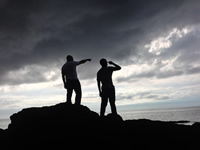
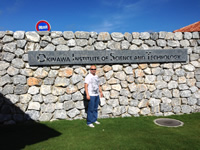
Research Project Update
This week we acquired 4 good samples starting on Monday, 2 Y branch samples and 2 single branch samples. The plan was to get data on all 4 samples at 235 and 215 degrees by Friday, unfortunately the Cryostat AFM broke down on Tuesday and required the assistance of my mentor to repair it. This took the rest of the week to repair and postponed our research, we were unable to acquire data for the remainder of the week. I was still able to put together a summary of the data we were able to acquire on Monday and early Tuesday for Fridays update.
The unfortunate series of events surrounding stimulus-triggered acquisition of pluripotency (STAP) started out as a glorious and welcomed event that could possibly change the face of stem cell research as well as help bolster the population of women researchers in Japan since it was published by a female researcher. The media surrounding this even when it first starting was all about the researcher Haruko Obokata and her gender as well as her quirks rather than the research itself, which after some other labs tried to reproduce the results came up empty handed. This eventually lead to the chain of events that started finding flaws and discrepancies in Obokata’s paper that got published in Nature, after an internal investigation two issues discredited Obakata’s professional integrity. She claims the findings and results of STAP are valid and she is able to reproduce them for any lab if allowed to, the error in judgment on her part for the manipulation of certain items in the paper had no ill intent from her just to improve the quality of the paper over all is her defense.
The greatest Issue now is the research itself, on both the media’s, Riken’s and Obakata’s hands, even if STAP is completely viable it will forever be tarnished now and could possibly be over looked regardless if it truly is a breakthrough or not just like cold fusion’s fiasco in the later part of the 20th century.
As I read through the articles and became somewhat empathetic with researcher Obokata story, I felt so many emotions and strings being pulled that so many factors came to mind. To start from the bottom I would say that Riken Center for Developmental jumped the gun in promoting the STAP research because the one leading the research was a female. I feel that it would have been handled differently if It had been a man because so much focus was put into the lead researchers gender than the research itself. As much as I want more women in science and more promoting of it, this is not the way it should it have been handled. Doing research over the summer in Japan has given me a more in-depth view of how the majority of research is conducted here. With a few exceptions here and there and I can see how publishing and especially the prestige of such research would be a great factor in the issues that arose. From hearing about her academic path from Waseda to Harvard’s medical school as well as hearing her own story of always having research on her mind, it seems she really wanted to do great things with her life and maybe this gave her the reasoning that it was okay to do what she did, as if she was above the research itself and this maybe have been her down fall and even worse the future research she could have done with professional integrity might never come to light
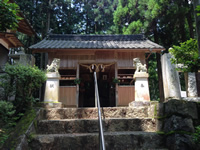
Musashi's Graveyard: As I stood in front of Musashi’s graveyard I was reminded that all journeys must come to an end and that I’m in the final few weeks of NanoJapan and even though this saddens me much, I’m excited for the next journey that will come next. I will be back but just like Musashi, I will go train in my craft and be better prepared for my next journey in Japan!
Research Project Update
This week we did not make much advancement with the research since my mentor and Aoki-sensei were making preparation for going to American to attend a conference and meet with Prof. Bird in Buffalo. One good thing that came of said preparations, is that I was given the opportunity to run the SPM/MFM unsupervised and put all the training and observations I had done the past several weeks to practice and I was able to finish up the scanning for the Y branch sample 02 with great success on my own
After ten weeks of participating in NanoJapan I can say that I have a better understanding of how research is viewed and conducted in Japan. A couple of weeks ago I had the chance of having a conversation with my NanoJapan “research buddy” about various topics relating to a science career and research in Japan. My research buddy’s degree is in NanoScience, a degree that isn’t offered as a title in the US but is similar to a Physics degree in the States which matches my degree and path up to this point. She explained to me that when she was in school she did very well in chemistry and biology and even planned to be a teacher in one of these subjects but she didn’t do so well and struggled with physics. Because of this she decided to be a teacher in physics to help other students who would struggle in this subject like her. This is how she ended up at the lab I was assigned to in Chiba, Japan. Being a student in Japan or the US have similarities but for different reasons, the course work seems more difficult in the US where you have to put more time into your studies and in Japan even if the course work isn’t as intense there are a lot more extracurricular activities and the emphasis is more on networking and being part of a group leaving little time for anything else. Another huge difference that I’ve noticed is that when I talked to Japanese students about their future plans or why they are in school the answer is always the same, to be hired by a company and work even if it’s a job opposite of what they went to school for. While in the US I feel we go to school more for a dream/goal or to work in a certain field we enjoy and don’t necessarily think about just getting a job/career as the Japanese students do. My research buddy had a different answer from the above and now that I’m writing this I realized that it was the women who I asked here in Chiba about what they wanted to be that had something other than the usual “get hired by a company” answer, which was said by all the men I asked.
The students working in the lab that I was surrounded for most of the time have limited international experience, most of them where 4th year undergraduates students or just starting their Master's so the only international experience any of the students in this lab get are from the NanoJapan students who are selected for Chiba each year. There are only a few international students and most of them are Ph. D. and have limited interaction with these students, and these international students are not from the US so they themselves did not know how a US lab was ran to compare the differences. Surprisingly enough I did not get too many inquiries about America. There were a few questions about things outside the lab about how Americans live or do certain things but not as much as I expected but there are two factors to take into account the first being the language barrier which might have limited their desire to ask me and the other NanoJapan student who was selected for this lab speaks Japanese and they might have asked her instead of myself since they could ask her in Japanese.
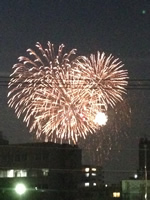
Sumidagawa Hanabi Taikai (Fireworks Festival): Went to go see Sumidagawa Hanabi Taikai! Japanese celebration were they set off fireworks for an hour, we arrived 5 hours before the fireworks display to reserve an area to see the fireworks.

Rising Sun: There is a reason they call Japan land of the rising sun, this was taken at 5:30 AM. As you can see the sun has already been up for a good hour!!
Research Project Update
This week Aoki-sensei and Matsunaga-san were both overseas in America, leaving another student in the lab and myself to work on scanning MFM images from the single-bar sample. We conducted a cold boot on the AFM which unfortunately altered some parameters on the software that were not as they were the week before, the images I scanned where not as clear as the week’s before but they were acceptable and without the presence of my mentor I was left to continue the scanning under these circumstances.
My perception and attitude towards Japan has changed drastically but not just towards Japan but for the whole world as well, including the US. I’ve learned that you just can’t judge a place or its citizens till you’ve actually spent time and talked to the people who live there. When before I could only speculate why things were from a distances, now I know and understand why things are as they are from an inside perspective and have come to have a great deal of respect for Japan and its citizens.
It’s funny as the further you get from America the less your race or ancestry matter and you just become an “American” to the rest of the world. Being born and raised in America I never really knew how the rest of the world viewed us and truly understood just how much influence America has on the rest of the world. I was always on the fence when I would hear the saying of how can we spend resources helping other countries when we have our own problems to deal with, now seeing how much other countries look to or notice America; I understand why we do what we can to assist other countries and have more understanding of our actions globally.
To say that I have changed from my experience in Japan would not do it justice, I would say that I have grown as a person and been enlightened by my overall experience. Japan just hasn’t answered questions I had about Japan or the world but it has answered many questions I had about myself. Growing up as a minority in America can at times make you feel like a foreigner in the very country you were born and raised in but in Japan I got to feel what it felt like to truly be an “American” without anyone questioning my nationality, loyalty or pointing out the differences between myself and their ideal of what an “American” looks like or acts and it was an amazing feeling! This experience has changed my personality drastically and I feel this is something that will carry over long after I get off the plane in the US.
The most frustrating obstacles while living in Japan was the language barrier and the different common sense people from different countries have. Not knowing the language of the country you’re living in, turns the most of mundane task into an adventure; like ordering a burger at McDonalds takes 5-10 minutes even if you know what you want before you approach the cashier. Common sense is another ingredient that adds to the daily frustrations I encountered, what may seem like common sense to you will not be to them and vice versa, just like the English I was taught is not the same English they were taught. On the bright side it has really expanded my understanding of other cultures and why they see or act differently to situations than what I would feel would be appropriate.
What is the one thing I will miss the most about Japan? I can’t really answer this honestly if I was to put just one thing, there is so much I enjoyed and experienced in Japan that it would be easier to say the one thing that I didn’t enjoy about Japan and that was the Humidity! For starters I’m going to miss the safety and item security I had in Japan, I could walk late at night to the Konbini and I didn’t have to worry about being robbed or attacked, and others on the street walking around me wouldn’t suspect anything from me and I from them, if I left my wallet full of cash anywhere I could go back in a few days and it would still be there or at the lost and found with every bill accounted for. I’m also going to miss how comfortable I felt in Japan, everything was so logical, efficient and practical, things I questions or felt could be improved in America was done here and it worked amazingly! If I was going to say the one thing over all that I will miss from Japan it will be the Japanese and especially Packard-Sensei! Japan is what it is not because of its mountains or attractions but because of its people, I have never felt so welcomed before in my entire life and it is cause of them. どうもありがとございました*bow*
After having such an amazing time in Japan I’ve decided to do my graduate studies here as well as be an exchange student for a semester or year before graduating with my bachelors so that I will be more fluent when I do start my graduate student in Japan. I plan to earn my Ph.D. in physics focusing on theory and feel having an experimental back ground will benefit me in my career in the long run and Japan is the perfect place to learn the experimental side of physics.
The final week in Japan went by so fast I didn’t get a chance to take a deep breath and just take it all in, the week started with our going away party which really hit home and reminded me how much the language barrier was and added more fuel to my desire to become fluent in Japanese. The lab wasn’t the only place where I made friends; I also become familiar with Chiba University’s exchange program known as J-Pac and got to meet new friends not just from Japan but from all over the world and had a going away party with them as well since for two others this would be their final week in Japan as well. I might have only spent a little over a month getting to know them but they embraced me as one of their own and wished I could have spent more time with them learning more about the countries they all came from. I spent the last couple of days finishing up my research project and to my surprise was able to with a lot of support from my mentors, I am grateful to have had so much support and guidance and plan to send them all a huge thank you letter and keep in touch with them as I continue down my academic path.
The final weekend in Japan I wasn’t too sure if I should stay in Chiba and spent some more time with my new friends or if I should take a trip I had planned to take but had not happened yet. Then, while talking to my friend Koko, I mentioned Hiroshima and she said it would be great to visit such a place of peace and I was amazed that she would say such a thing and I was so happy she thought of it like that. Inspired by such words I decided Hiroshima would be my last trip I take in Japan and set forth still pondering why she would have said such a thing. As an American I feel so much guilt over it and as an aspiring physicist it doubles that guilt that I felt but I wasn’t prepared or understood what I was getting myself into. After seeing the monuments outside of the museum I decided it was time to go inside and the first thing you encounter as you enter is a video playing talking about all the people located in Hiroshima and how many where effected by the atomic bomb, there was not a dry eye in the crowd which continued to add weight to that guilt that was stuck in my chest. I then proceeded to go down the designated path and I could not believe what I was seeing, reading, and hearing and then I understood those words Koko said to me just the day before “a place of peace”. The people of Hiroshima, after witnessing such an atrocious act of death and destruction did not have a feeling of vengeance or animosity but instead only wish that no one else would ever have to experience what they had. The museum showed how Hiroshima was built back up from the rumble of the atomic blast by its people and promoted the end of atomic weapons and peace throughout the world. I have to say this was such a shock to me, I didn’t expect to see or experience anything like this here but it really put into perspective of what Japan stands for now and hopes to be moving forward.
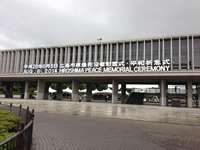
Just missed the ceremony: While visiting Hiroshima I didn’t realize there was a peace memorial happening in just a few days; unfortunately I fly back to the states on the 5th but I enjoyed my visit immensely!
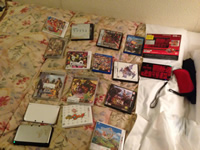
Japanese Learning Tools: With our departure short at hand Chris Miller and I went out and acquired valuable Japanese learning material to improve our Japanese for when we will return in a couple of years to Japan!
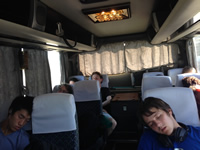
Ride to the airport: My ride to the airport was a quiet one….
FINAL RESEARCH PROJECT ABSTRACT AND TOKYO RESEARCH SYMPOSIUM OVERVIEW
Magnetic-Domain Structure of Cobalt Nanomagnets with Single-Notch and Y-Branch Geometries
Chiba University; Ochiai & Aoki’s lab, Yuichi Ochiai-sensei, Nobuyuki Aoki-sensei, Masahiro Matsunaga-san
The task of my research was to scan single-bar and Y-branch nanomagnets and find the relationship between the vortex and MFM image. Does the extra branch in the Y-branch nanostructure cause the vortexes that have been observed in it? This is the question that was asked that brought around my project and if it was found to be so then there would be a potential of turning Y-branch nanomagnet into a magnetic switch.
We utilized a stage that was small enough to fit inside the AFM that could induce a magnetic force and could be scanned at the same time. This would allow us to be able to see the actual MFM image as we changed the magnetic force on the sample and not just have simulated data representing the data acquired from magnetic resistance graphs.
The results of our scanning showed that the vortex only appeared on the Y-branch sample and not the single-notch sample, this clearly shows that the extra branch on the on the Y-branch nanomagnet does cause these vortexes that appeared at the location of the nanojunction. The next step of the research will be to see if this anomaly can be utilized as a magnetic switch and if so would be used to improve magnetic storage devices by decreasing the size and increasing the capacity of these devices.
Research Symposium in Tokyo Overview
The Research Symposium in Tokyo was the first time I was to attend or present in a Symposium and at first I thought it would be like a convention but as the date got closer and more details arised it started to seem like it was something else entirely and this was the case after all. I revised my PPT presentation a few times before coming up with the final version as details of the symposium became clearer and at the end was informed that I wouldn’t be doing a single presentation but a joint one with my host university’s mentor.
I enjoyed the fact that it gave me a chance and environment to work on my presentation skills as well as promoting international internships for students in both Japan and the US, it was also nice to see my fellow NanoJapan peers’ research and their experience living in Japan these past few months. It was nice seeing some of the past presenters from the orientation in Tokyo and individuals from Japan who desired to do the same kind of program but from Japan’s side in one place and showing interest in our experience and possibly influenced by it.
When speaking to my family I would say one of the most important things I learned from NanoJapan was the experience of what it’s like to have a career in the STEM field. From the traveling to getting to meet great and amazing people along with all the deadlines and late nights doing research, writing papers and making PPT presentation and posters. Another important thing I learned was what it was like to live in another country and be a foreigner; it really gives you a new perspective on the world and yourself and the experience changes you one way or another.
When speaking to a professor about what I learned from NanoJapan, I would say that I have learned about the science and research fields more intimately and have concluded this is where I truly want to be and has confirmed that going down the academic path I have is the right path for me. I learned to be a more global thinker, when before I only thought of attending US institutions and that my future research would only be conducted in and affect the US now I think about other foreign institution to do my graduate studies at and how to better improve my collaboration with other countries in my future research. I’ve also learned how important communication is in research and have put more importance in understanding someone instead of just listening to them, as well as have continued studying foreign languages. Last but not least I’ve learned that time and hard work pays off in the end which has only strengthened my focus on acquiring my Ph.D. in Physics, when before it was only a dream now it’s a landmark on my path to being a valued researcher.
When speaking to an employer about what I learned in NanoJapan I would say that I learned to work with a group but just not any group an international group of collaborating researchers and scientists, I’ve learned to work well with others from different countries, culture, backgrounds and all while we spoke different languages. I’ve also learned to not only work with but to be part of a group, as to understand them and connect with them as to where their views and perception comes from which might differ to mine. I also learned to prioritize my time and obligations to meet and reach deadlines proficiently and effectively all while living abroad for the first time; this also taught me how to adapt from the experience of a Japanese work environment comparted to a US workplace. From this experience I realized just how important it is to be a global thinker and that it’s one of the most important things I learned while participating in NanoJapan that not only people but companies and institutions as well are all connected by the global and educational market.
If a student asked me about NanoJapan I would tell them that before participating in NanoJapan, I felt I knew myself and the world pretty well and in comparison to others around me this is true. But the person who came back from NanoJapan could say the same about the person I was before NanoJapan. When you study abroad you’re forced to think more about the world and other countries which isn’t the case when studying in America from my experience, I learned so much from meeting people from Japan and other countries about the world through their perspectives. This has really allowed me to broaden my horizons and taught me to have a more global mindset and not just think about my community, state, or nation but to think of the world when I make decisions that will either affect me or others. I also learned that regardless of your nation or culture and predisposition from where you come from that there are variants within communities and beyond all that categorizing, that deep down inside we are all more similar than different. While working in a research lab I also had the chance to learn about working in another country and all the nuances that comes with it, I learned exactly how important communication truly is and that there is more than one version of a language so even if you speak the same language there can still be great miscommunication between individuals. The work environment in Japan and the US is different, in some ways better and others not so but this is all subjective but was a great way for me to explore different ideas on what is best for myself and for my academic and career path.
What I will do differently as a result of participating in NanoJapan, well I think more globally and hence most of my decisions from now on will be subject to my new global thinking. When before I was happy to go to any top University, now I plan to apply to a more globally recognized University so it will be more accessible to do internationally collaborated research. I have also decided to do my graduate studies abroad as well, specifically my masters at one of Japan’s top universities and then will decided after where to acquire my Ph.D. degree wither in Japan or another country with top research facilities. Since I plan to do my graduate studies in Japan I will continue to study Japanese and plan to study abroad for a semester or two before graduating so that my Japanese won’t be as much as a hindrance when I start my Master’s program as it was during the NanoJapan program. I will also continue to apply for summer research internships abroad, specifically Japan but I am open to other top research countries as well so that my international collaboration extends to other countries beyond Japan. When I start doing research on my own I plan to collaborate with as many countries as possible to build up a large international network in which to push out and discuss great innovative ideas with. On a side note I felt so comfortable in Japan that I might just make it my permanent home.
At this point there is only one true question I truly have for Japan that’s been burning ever since I decided that I would like to attend a Japanese university and that is, if they want foreign students to come over and there is desire and great effort given for such an endeavor why do they not have some kind of transfer program or procedure set in place for students who wish to transfer from a University and especially students who have graduated from a 2 year institution?
Pre Departure Tips: Bring a bag to carry with you as you go around Japan such as a messenger bag or buy a small backpack as soon as you get there. Most places will have lan but not wifi so bring a wireless router so you can have wifi just in case. The toiletries in Japan are slightly different in one way or another so if you have a “special” shampoo or shaving cream and don’t want to hassle with such things buy them in the US and bring them with you. Learn Hiragana & Katakana and as much Japanese as possible, especially if English isn’t spoken much in your lab. Come with an open mind for adventure and the unknown, it will be well rewarded in Japan! A JR pass is worth it if you plan to take a few long trips on the shinkansen if not then you’ll be better off just buying a ticket for a trip or two.
Orientation Program Tips: The orientation schedule is intense, especially the language classes, but well worth it so give it your all and Packard-sensei is an amazing individual along with the KIP students. They will be your first point of contact and friends in Japan so don’t be afraid to confide in them with any questions you might have. So “GO FULL SWING!”
Mid-Program Meeting Tips: This is a semi-break from your daily & lab schedule to meet up again with the other NanoJapan participants and reflect on your past month at your lab and see how everyone else’s research is going. Our meeting was in Okinawa and it’s more humid than anywhere else in Japan so come prepared!
Working With your Research Lab Tips: My lab mostly spoke Japanese with very little English so knowing very little Japanese was a bit of an obstacle but every chance I had to speak some Japanese with them I took it. I used Google and other translation programs to assist communication with them and it worked out better than not communicating with them at all. If I had known how relaxed, laid back and welcoming my host lab was I wouldn’t have been so nervous on meeting them on that first day.
Living in your Research Host City: You’ll be likely living in the Chiba International House with other international students so be open to say hi and talk to anyone you see walking around in your dorms. The international students and Japanese students who want to meet English speaking individuals hang out at the English house so whenever you have time or feel the need to speak English go for a visit and you’ll meet some great people there, they also make plans to go out as a group so this is a great way to meet new friends and see more of Japan. Chiba feels like just another district in Tokyo with less English so be prepared to struggle a bit if you don’t know Japanese so well but you’ll have all you need within walking distance.
Language Study Tips: Learning a new language takes time as Shimojo-senei told me “It’s much like gardening or growing a tree. You normally don’t notice a difference daily but sometimes all of sudden you realize the growth.”. So start working on Hiragana & Katakana as soon as possible as well as sentence structure and particles, you might not feel any improvement before you start the orientation program or even during but you will by July and it’ll be a great feeling when it all just comes to you so naturally. I also suggest taking Language classes at your host university to continue the process of learning a new language, you probably won’t feel the impact of these classes till the last week or two of the program but it’ll pay off in the end. One thing I learned from a fellow NanoJapan student was that playing Japanese videogames helps improve your Japanese reading skill greatly, so while in Japan get yourself a handheld and some games to play on the subway and during your free time when you have nothing else to do and to bring to the US to continue your exposure to the Japanese language since it will be greatly diminished in the US.
Other Tips